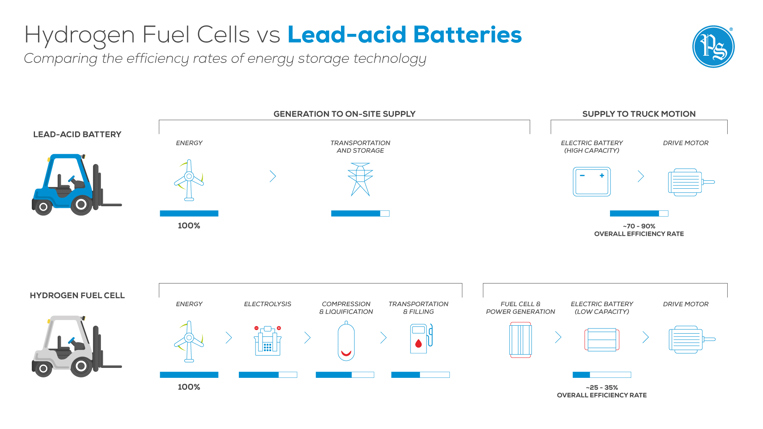Hydrogen Fuel Cells - A load of hot air?

MONTGOMMERYVILLE, PA, December 4th 2020: Efficiency. A word that is becoming a little more commonplace place now, means, the state or quality of being efficient, the ability to do things well and without waste. Following on from our last article, how price is an important factor when considering what energy storage technology to choose, we’ve decided to look into another energy storage technology, the hydrogen fuel cell.
Hydrogen fuel cells are often touted as a viable alternative energy source to “traditional” energy sources. When it comes to material handling equipment or even automobiles and factories, it is said that hydrogen fuel cells can be a realistic replacement for powering today’s machinery and equipment. In comparison to coal, oil, and gas, they are a hundred times better for sure, but in comparison to lead-acid batteries, we were not too sure they stacked up. We looked into this a little bit further.

As you can see, the energy efficiency of using a hydrogen fuel cell in a forklift truck isn’t great, in fact it’s really quite poor. The infrastructure required in even getting the fuel cell to the truck is truly inefficient and by the time it gets to the truck, the energy output is 25% as efficient as “traditional” lead-acid batteries.
If the intended result is a sustainable, viable alternative form of energy storage, then the technology has still got a long, long way to go. The efficacy just isn’t there. The fuel cell technology on the most part is renewable and environmentally friendly but still usually using fossil fuels to separate it from oxygen. Lead-acid batteries are nearly 100% recyclable and have been for nearly 150 years. If you then simply take into account the energy efficiency, there really isn’t any competition, lead-acid batteries outperform there as well.
We all need to be more environmentally aware and should always be looking to improve our environmental impact. Hydrogen fuel-cells could be great in that respect, but there are still a lot more improvements needed before it’s even near a viable alternative.
What do you think? Start a conversation with us across our social media channels or if you’d like to discuss how we got to our result, get in touch via https://www.phlsci.com

